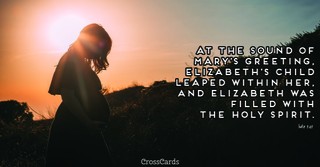
- Recent Translations
- All Translations
Lukas 1:7
Share
Settings
Images for Lukas 1:7

Lukas 1:7 Meaning and Commentary
And they had no child
Son or daughter: and which was accounted a great infelicity: but this was not owing to the judgment of God upon them for any sins they had been guilty of, as the above character of them shows: and it had been the case of some righteous pairs before them for a great while, as Abraham and Sarah, Manoah, and his wile, Elkanah and Hannah:
because that Elizabeth was barren;
so that it was peculiarly her case, and not Zacharias's: and though God had promised the people of Israel that there should be no male nor female barren among them, ( Deuteronomy 7:14 ) yet there were instances and exceptions to this general rule, as before mentioned, when it was the pleasure of God to make himself known, and magnify his power in the extraordinary conception and birth of any person; and therefore, though barrenness was reckoned a reproach to a person, there was, in this case, a particular hand of God, to answer a special purpose: the signs of sterility are, according to the Jews F2, when a woman had not breasts as other women have, her voice gross, so that it could not be discerned, whether it was a man's or a woman's
and they both were now well stricken in years;
which made the conception and birth of John the more extraordinary, and even
miraculous, and so the belief of it the more difficult; see ( Genesis 17:17 ) It may be literally rendered, "they had proceeded", or had far advanced "in their days": it is an "Hebraism", and answers to, (Mymyb Myab) in ( Genesis 18:11 ) ( Joshua 13:1 ) ( Joshua 23:1 Joshua 23:2 ) ( 1 Kings 1:1 ) where the Septuagint render it by the same phrase as here. The Mahometan writers Beidavi and Jallallo'din say F3 that Zacharias was "ninety nine" years of age, and his wife "eighty nine".
F2 T. Bab. Yebamot, fol. 80. 2. Maimon. & Bartenora. in Misn. Yebamot, c. 1. sect. 1. & Maimon. Hilch. Ishot, c. 2. sect. 6.
F3 In Koran, c. 3.